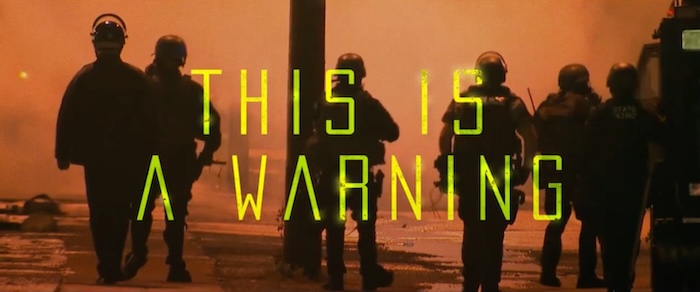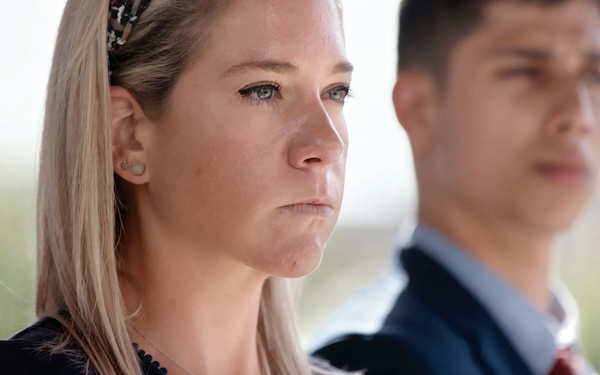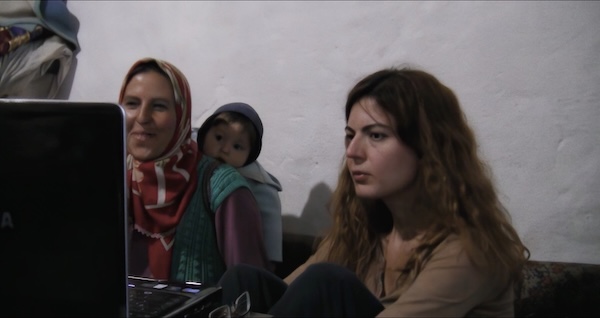Film Review: GlobeDocs 2024 — A Wrap-Up
By Neil Giordano
For its 10th anniversary, the Boston Globe’s documentary festival expanded its cinematic field to a wide variety of genres and subjects.
Last weekend, the annual GlobeDocs festival celebrated its 10th anniversary, screening a wide-ranging sample of the year’s most anticipated documentaries.

A scene from Porcelain War. Photo: GlobeDocs
Porcelain War opens with entrancing images of nature: verdant landscapes, insects alighting on plants, a glassy pond. This is a documentary about the Ukrainian artists who have made these images, and who, because of the conflict, have also become soldiers. Minutes later, the images on screen will be transformed, violently. Set in and around Kharkiv, the film posits that there is no line between civilians and combatants in the conflict with Russia. Sequences of beauty are juxtaposed with those of destruction: we see missile attacks on homes; body cams provide footage of raids; powerful visions of aerial battles seen from the perspective of drones. The latter are used to dramatize a fusion of artistic and military aims: the artist-soldiers decorate the flying machines, which are used to drop improvised explosives on Russian positions.
Partners in life and art, Slava Leontyev (one of the directors) and Anya Stasenko anticipated and dreaded what this war would do to their lives, glimpsing the grim future when Russian invaded the Crimea in 2014. The film’s title conveys its central metaphor: the artists are dedicated to making gorgeous, whimsical, brightly colored porcelain figurines. (They are sometimes animated for the film.) These figures are fragile yet tenacious; a poetic voice over underlines, unnecessarily, the film message linking resistance with art. A striking original score, by Ukranian folk quartet DakhaBrakha, adds additional resonance to the pair’s sad but triumphant story about what it takes to exercise the imagination under horrendous circumstances.

A scene from 2073. Photo: GlobeDocs
The centerpiece film of GlobeDocs was 2037. It was billed as a hybrid narrative-documentary feature about Earth’s ecological armageddon. The problem is that the effort offered lots of troubling questions but no coherent calls to action. Director Asif Kapadia (maker of the exceptional biographical docs Amy and Maradona) tosses a lot at the Climate Crisis wall and not all of it sticks: contemporary news footage, voiceovers intoning portentous quotations, stark images of corporate hegemony and consumer passivity. On top of that comes, most unconventionally, speculative fiction in the form of a futuristic drama starring Samantha Morton. I am interested in blurring the lines between documentary and fiction, and Morton is a powerful actress. But the mishmash of all these different elements comes off as more of a concept of a movie than a movie (to paraphrase a politician who is one of the many critical targets of 2037). There’s potential in some striking visuals and sequences regarding what’s to come; a forlorn Morton sends out alarming transmissions to those who live in the past. Ultimately, though, this film about the future doesn’t tell us anything we don’t already know now. The future-jump trope is an obvious bow to the French experimental film La Jetee, but 2037‘s execution is perhaps more reminiscent another ambitious failure, the beautiful but incoherent Cloud Atlas.

A scene from Union. Photo: GlobeDocs
An example of more traditional documentary fare, Union suggests that the repugnant labor practices of Amazon.com might be reined in someday. The film depicts the months-long unionization battle, in 2022, at an Amazon fulfillment warehouse in Staten Island. Lauded doc filmmakers Stephen Maing and Brett Story teamed up for the first time, and I wondered how they would work out their clashing styles. In his films, Maing draws on cinema verite, as in 2018’s Crime + Punishment, which is about corruption within the NYPD. Story often takes a more abstract, visually creative approach in her docs, as in 2019’s The Hottest August. Story’s style assumes command in the long-duration shots that bookend the film; it is the sight of giant cargo ships entering the port, ostensibly filled with goods on their way to the warehouse and then to U.S. consumers. But most of Union reflects Maing’s approach, charting the up-close confrontations and small triumphs of union organizers as they wage a David vs. Goliath battle against the retail juggernaut known for how it optimizes its profits by minimizing working conditions for its labor force.

A scene from Zurawski v Texas. Photo: GlobeDocs
The festival’s timeliest film, Zurawski v Texas, charts the hellscape of post-Roe America. The film is appearing, miraculously, just months after an opinion was issued in the eponymous lawsuit that battled against restrictions set up for abortion access in the Lone Star State, whose draconian laws prevent pregnant women from receiving life-saving medical care. The film opens with plaintiff Amanda Zurawski painfully recounting her pregnancy loss to a Senate panel investigating the overturning of Roe v Wade. Zurawski notes that Senator Lindsey Graham snidely rolled his eyes as she told her story; this toxic arrogance sets the tone for the film’s condemnation of the highly gendered split on the issue. Abortion opponents, mostly men in power (Texas AG Ken Paxton, the primary antagonist) apply a disdainful ignorance to the task of controlling women’s bodies. Women suffer the consequences, sometimes dying in the process. The words of mothers, OB/GYNs, medical researchers — anyone with real experience, knowledge, or compassion — are routinely ignored in order to push through absurd rulings. There is a glint of hope here, because there are scenes when we see dyed-in-the-wool conservative Texan men –relatives and friends of the women affected — begin to question what being “pro-life” really means when it leads to the horror stories depicted here.

A scene from The Cinema Within. Photo: GlobeDocs
The Cinema Within (presented in the virtual cinema screenings of the GlobeDocs program) revisits the theoretical underpinnings of film editing, exploring how a skillful juxtaposition of shots and sequences generate cinematic meaning. In some ways, the documentary simply rehashes well-known film theory: Walter Murch (Oscar-winning editor of Apocalypse Now, The English Patient, et al) and film scholar David Bordwell show how the history of film is essentially the history of editing. Along with this pair, a variety of cognitive psychologists and neuroscientists weigh in on how film editing techniques can make us see things that aren’t really there. To illustrate how this works, at one point the film edits together a chat among the academics — all in different cities — as if they are having a conversation in person. This neat but bizarre trick juxtaposes a white-bearded Murch in the present, showing us a past presentation he gave, with an actor playing a younger Murch, who is talking about editing.
These meta approaches, while clever to some degree, pale in comparison to the other half of the film, which goes into new research by a young Turkish academic, Sermin Ildirar. She puts her theory about editing into action in a remote mountain village where the residents have had no contact with modern visual media. She films the residents, then edits the footage into sequences. At first, they don’t understand that the “movie” is telling a story. But, as her research continues, the residents (and we, the viewers) eventually come to understand how powerfully a story can be told through images.
A happy coda: Local filmmaker Lisa Olivieri won the GlobeDocs Audience Award for her powerful Recovery City, an unsentimental and clear-headed look at addiction from the viewpoint of clinicians, activists, and women trying to claw their lives back to normalcy while fighting the stigma of addiction. (Arts Fuse review here)
[Porcelain War will open in theaters on November 22 in New York, distributed by PictureHouse. 2037 will be in wider theatrical release later in 2024 via Neon. Union is in limited theatrical release and will be streaming by year’s end (most definitely not on Amazon Prime). Zurawski v. Texas and The Cinema Within have not secured distribution but continue to run in festivals.]
Neil Giordano teaches film and creative writing in Newton. His work as an editor, writer, and photographer has appeared in Harper’s, Newsday, Literal Mind, and other publications. Giordano previously was on the original editorial staff of DoubleTake magazine and taught at the Center for Documentary Studies at Duke University.
Tagged: "2073", "Porcelain War", "Recovery City", "The Cinema Within", "Zurawski v Texas", Anonymous Sources, GlobeDocs
